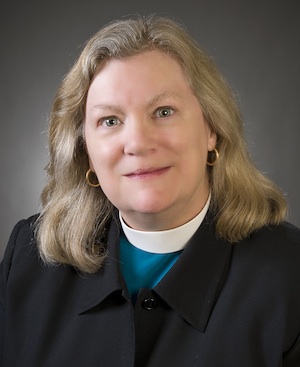In a surprisingly wide-ranging speech, which covered the dearth of crocodiles and popularity of curling in Chaska, MN, among others, President of the House of Deputies, the Revd Gay Clark Jennings, also covered more serious ground when she turned her opening remarks at the Executive Council meeting to the state of gender equality in the church.
As I look back on our struggles for gender equality and look forward to what I pray will be a vital, sustainable future for our beloved church, I think those of us who are committed to gender equality need to be sure we are focused clearly on the church as it is today, not the church as it was on September 16, 1976. In particular, too often I hear us measuring gender equality in the church by counting how many educated, privileged women sit in positions of hierarchical authority. I fear that we may believe that the best the church can do for women is to be sure that more of us are bishops, deans, and cardinal rectors.
I don’t mean to minimize what some call the stained glass ceiling. As the first ordained woman to be elected president of the House of Deputies, I have some sense of the institutional barriers in the way of ordained women, whether they are baby boomers, GenXers, or Millennials. I have worked hard to help us move toward gender equality within the institutional church, and we’re not there yet.
But defining gender equality only by measuring the status of educated, ordained women could lull us into believing that the church will be transformed primarily by women who succeed in systems built and shaped by patriarchal authority. And after thirty-seven years of ordained ministry, I’ve come to the conclusion that’s not how it works.
Politics, business, and, unfortunately, even the church provide ample evidence that simply having women in authority is no guarantee that institutions will be more just, more fair, or more Christlike. It isn’t enough to have women ascend to the top of the church’s systems. We must also change the systems that have promoted inequality for so long and continue to reinforce it for the vast majority of our sisters, lay and ordained. That means that when women are elected or chosen, our work has only just begun.
Gender equality cannot be more equal for some women than for others, argued Jennings, citing poverty, domestic violence, gender identity and expression, immigration status and race among the factors that still tend to mitigate against full inclusion and equality, concluding,
If our quest for institutional parity prevents us from standing in the crowd alongside the woman who touched Jesus’ garment to be made well, then no number of women clergy or bishops will ever make us whole.
We can do this. We can do it because we have the strength and spirit of the sisters who began the struggle and the men who have accompanied them along the way and have gone before us. They were really, really elastic, and we can be too.
Thank you. I look forward to stretching together this week.
Read her full remarks here. You may also be interested in the sermon that Jennings preached at the opening Eucharist of this Executive Council meeting, which will conclude on Friday.

